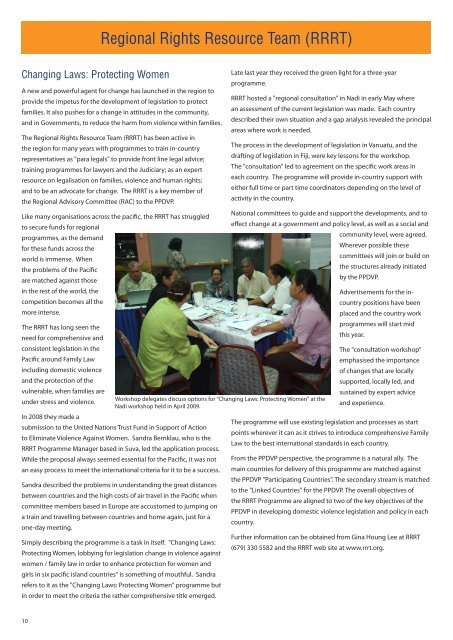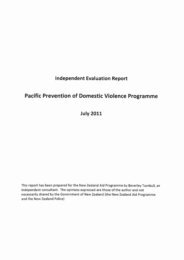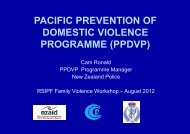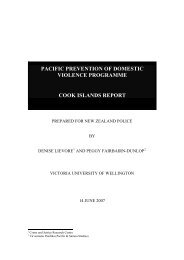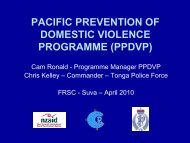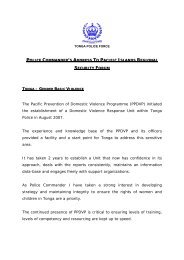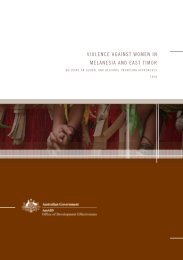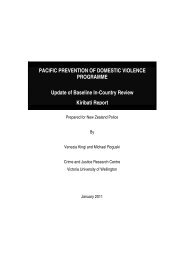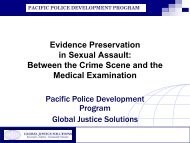July 2009 - Pacific Prevention of Domestic Violence Programme
July 2009 - Pacific Prevention of Domestic Violence Programme
July 2009 - Pacific Prevention of Domestic Violence Programme
- No tags were found...
You also want an ePaper? Increase the reach of your titles
YUMPU automatically turns print PDFs into web optimized ePapers that Google loves.
Regional Rights Resource Team (RRRT)Changing Laws: Protecting WomenA new and powerful agent for change has launched in the region toprovide the impetus for the development <strong>of</strong> legislation to protectfamilies. It also pushes for a change in attitudes in the community,and in Governments, to reduce the harm from violence within families.The Regional Rights Resource Team (RRRT) has been active inthe region for many years with programmes to train in-countryrepresentatives as "para legals" to provide front line legal advice;training programmes for lawyers and the Judiciary; as an expertresource on legalisation on families, violence and human rights;and to be an advocate for change. The RRRT is a key member <strong>of</strong>the Regional Advisory Committee (RAC) to the PPDVP.Like many organisations across the pacific, the RRRT has struggledto secure funds for regionalprogrammes, as the demandfor these funds across theworld is immense. Whenthe problems <strong>of</strong> the <strong>Pacific</strong>are matched against thosein the rest <strong>of</strong> the world, thecompetition becomes all themore intense.The RRRT has long seen theneed for comprehensive andconsistent legislation in the<strong>Pacific</strong> around Family Lawincluding domestic violenceand the protection <strong>of</strong> thevulnerable, when families areunder stress and violence.In 2008 they made asubmission to the United Nations Trust Fund in Support <strong>of</strong> Actionto Eliminate <strong>Violence</strong> Against Women. Sandra Bernklau, who is theRRRT <strong>Programme</strong> Manager based in Suva, led the application process.While the proposal always seemed essential for the <strong>Pacific</strong>, it was notan easy process to meet the international criteria for it to be a success.Sandra described the problems in understanding the great distancesbetween countries and the high costs <strong>of</strong> air travel in the <strong>Pacific</strong> whencommittee members based in Europe are accustomed to jumping ona train and travelling between countries and home again, just for aone-day meeting.Simply describing the programme is a task in itself. "Changing Laws:Protecting Women, lobbying for legislation change in violence againstwomen / family law in order to enhance protection for women andgirls in six pacific island countries" is something <strong>of</strong> mouthful. Sandrarefers to it as the "Changing Laws: Protecting Women" programme butin order to meet the criteria the rather comprehensive title emerged.Late last year they received the green light for a three-yearprogramme.RRRT hosted a "regional consultation" in Nadi in early May wherean assessment <strong>of</strong> the current legislation was made. Each countrydescribed their own situation and a gap analysis revealed the principalareas where work is needed.The process in the development <strong>of</strong> legislation in Vanuatu, and thedrafting <strong>of</strong> legislation in Fiji, were key lessons for the workshop.The "consultation" led to agreement on the specific work areas ineach country. The programme will provide in-country support witheither full time or part time coordinators depending on the level <strong>of</strong>activity in the country.Workshop delegates discuss options for "Changing Laws: Protecting Women" at theNadi workshop held in April <strong>2009</strong>.National committees to guide and support the developments, and toeffect change at a government and policy level, as well as a social andcommunity level, were agreed.Wherever possible thesecommittees will join or build onthe structures already initiatedby the PPDVP.Advertisements for the incountrypositions have beenplaced and the country workprogrammes will start midthis year.The "consultation workshop"emphasised the importance<strong>of</strong> changes that are locallysupported, locally led, andsustained by expert adviceand experience.The programme will use existing legislation and processes as startpoints wherever it can as it strives to introduce comprehensive FamilyLaw to the best international standards in each country.From the PPDVP perspective, the programme is a natural ally. Themain countries for delivery <strong>of</strong> this programme are matched againstthe PPDVP "Participating Countries". The secondary stream is matchedto the "Linked Countries" for the PPDVP. The overall objectives <strong>of</strong>the RRRT <strong>Programme</strong> are aligned to two <strong>of</strong> the key objectives <strong>of</strong> thePPDVP in developing domestic violence legislation and policy in eachcountry.Further information can be obtained from Gina Houng Lee at RRRT(679) 330 5582 and the RRRT web site at www.rrrt.org.10


